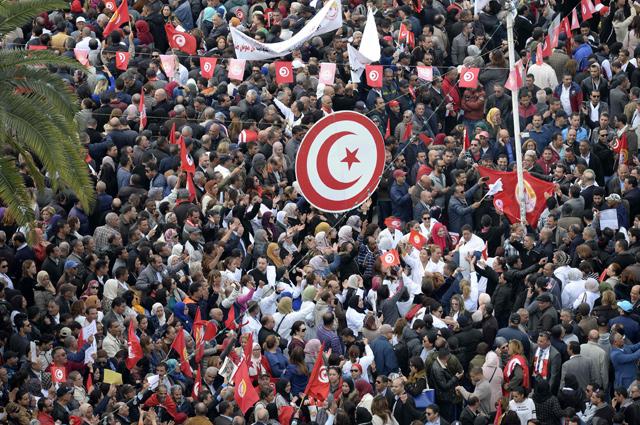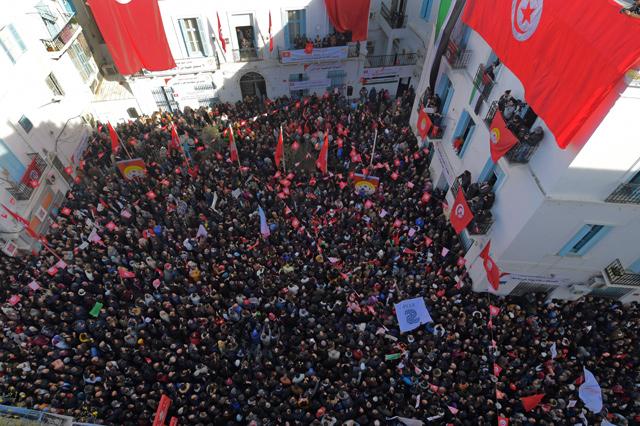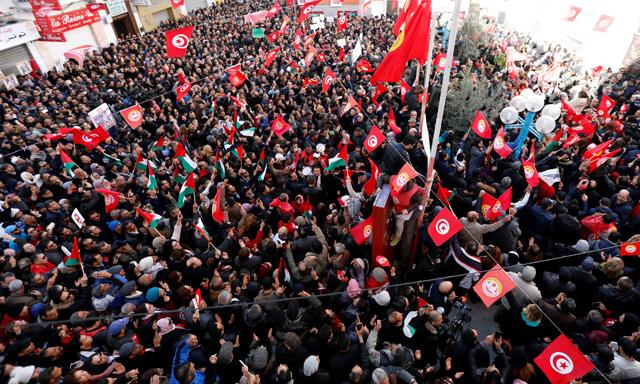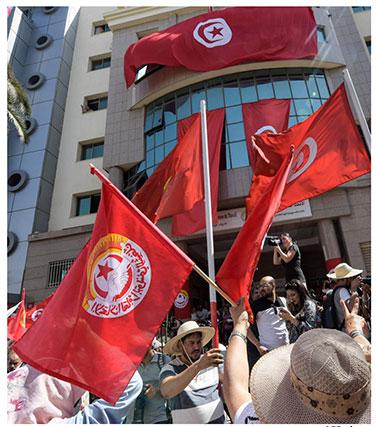You are here
Tunisian civil servants stage largest strike in years
By AFP - Nov 22,2018 - Last updated at Nov 22,2018

Tunisian protesters wave national flags and chant slogans during a civil servants general strike after the failure of negotiations with the government on salary increases in the capital Tunis, on Thursday (AFP photo)
TUNIS — Tunisian civil servants staged the largest general strike in five years on Thursday after their powerful trade union failed to secure wage hikes in tense negotiations with the government.
Thousands of people gathered outside parliament, responding to calls from the Tunisian General Labour Union (UGTT) for demonstrations.
“You have destroyed these people, you have starved them,” the union’s Secretary General Noureddine Taboubi said at the rally.
“We will not yield to your liberal choices, we will take campaign decisions and mobilise all sectors,” he added
The UGTT is demanding 673,000 state employees receive salary bumps equal to those granted this year to public companies, which range from 15 to 30 euros ($17-34) a month.
Bouali Mbarki, UGTT deputy secretary, told AFP the wage increase “had not been taken into account in the 2019 state budget”.
The demands for wage hikes are tied to “an unprecedented rise in prices, a deterioration of citizen purchasing power... and a degradation of daily life”, Mbarki said.
Civil servants represent a sixth of Tunisia’s workforce and Thursday’s strike, the widest of its kind since 2013, marked their first walkout over wages in decades, according to the UGTT.
The union said 90 per cent of the country’s civil servants took part in the strike, crippling ministries, hospitals and public schools, although public transport continued to run.
Tunisia not for sale
In Tunis protesters chanted “the wage increase is not a favour” and “Tunisia is not for sale”, also employing a popular slogan of the country’s 2011 revolution — “work, freedom, national dignity”.
Beyond the capital, demonstrations were also held in numerous cities including coastal Sfax, where protesters marched to the local government headquarters.
In Gafsa, a central mining area, hundreds of people protested following a speech by the local head of UGTT, an AFP correspondent said.
Donors keeping Tunisia afloat have called on the government to control civil service salaries to avoid pushing up the public deficit.
But Mbarki said the government “must find a solution without being subjected to the instructions of the International Monetary Fund [IMF] — even if it has made commitments with it — and preserve social stability”.
Mbarki said the union was “not negotiating with [head of the IMF] Christine Lagarde but with the head of the Tunisian government”, Prime Minister Youssef Chahed.
The North African country is seen as having had a relatively smooth democratic transition since the January 14, 2011 toppling of President Zine Al Abidine Ben Ali after 23 years in power.
At the same time price hikes, fuelled in particular by the fall of the Tunisian dinar, combined with tax increases and stubborn unemployment have spurred social discontent that escalated into riots across several cities in January.
In 2016, the IMF granted the North African country a 2.4-billion-euro loan over the span of four years in exchange for a promise to carry out economic reforms.
In recent months, political life in Tunisia has been paralysed by power struggles ahead of presidential elections set for 2019.
Related Articles
TUNIS — Tunisia's powerful UGTT union called on Saturday for another national strike for two days next month to press its demand for higher
TUNIS — Rail, bus and air traffic stopped in Tunisia and street protests drew thousands on Thursday as the huge UGTT union staged
TUNIS — Flights were cancelled, public transport ground to a halt and government offices were closed in a nationwide strike by Tunisia's mai


















